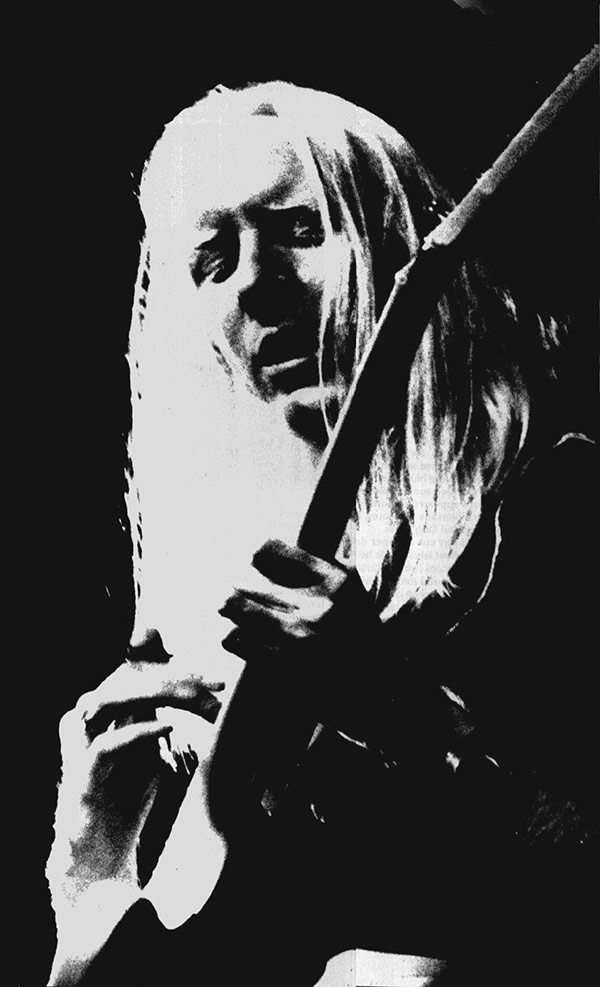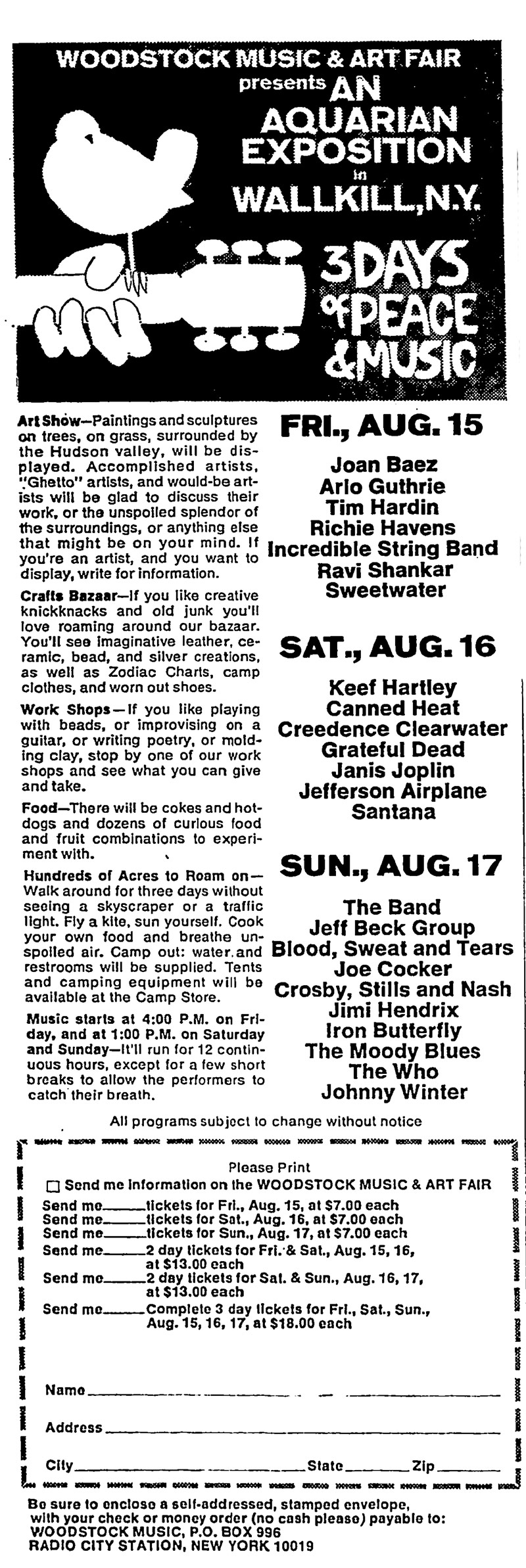By Ray Brack
The incredible influx of 800,000 rock freaks to Max Vasgar's upsale New York dairy farm for the Woodstock Art and Music Fair last week was a predictable climax to a summer-long series of bummer pop music festivals, In vain attempts to remix the ingredients that produced unforgettable vibrations at the historic Monterey (Calif.) pop music festival in 1967 (Janis, Jimi, Otis and grass on the grass were the magical mystery elements), pop promoters have been booking ever heavier casts of rock talent into gigantic open-air circuses ever since. The impressarios hit their festival stride this summer. scheduling a dozen or more major rock extravaganzas at or near most of the nation's large population centers.
First indications that the 1969 festival season was to be a "down" scene came from the Newport Festival at Devonshire Downs in the northern end of California's San Fernando Valley. (The festival took its name from its proximity to Newport Beach. and should not be confused with the older festivals at Newport, R.I.) tHE PROMOTERS of this June 20-22 festival promised to deliver a mind-expanding rock bill that included Jimi Hendrix Experience, Joe Cocker, Janis Joplin, Albert King, Edwin Hawkins Singers, Creedence Clearwater Revival. Steppenwolf, Buffy St. Marie, Albert Collins, Johnny Winter, Booker T. and the MG's. Rascals, Byrds and Three Dog Night.
Incredibly, all those big votes showed, and so did 150,000 kids. That is io say. 130,000 gut into the old fair-grounds where the action was. Thousands of others were turned away. (For two months Newport was to hold the record as the largest pop festival ever held.) Unfortunately, the promoters drastically underestimated the pulling power of a conglomerate of contemporary rock performers. Only a fraction of the crowd that made it into the festival grounds ever heard the music, because the sound system was woefully inadequate, The audio problem was aggravated by the thudding overhead of an omnipresent police helicopter.
Even fewer people could see the performers sight lines being limited by a low, six-foot stage_ And 100-foot queues marked the inadequate number of stinking overflowing portable toilets at all times. WHILE THE VIBES turned sour inside, the scene outside the festival grounds soon waxed violent. Since tickets cost 5$. hundreds of youngsters came to the festival admittedly to crash the gate. During a disorganized assault on the festival's $11,000 worth of hurricane fencing, severe hassling with police commenced. Some of the kids blew their cool and launched rocks and bottles. The cops counter-attacked with batons.
When the three-day casualty tally was taken, it showed 300 injured (15 policemen) and 75 arrested. An estimated $50,000 in damage had been done to homes and businesses in neighboring Northridge. Producer Mark Robinson claims the whole atrocity lost him $150,000. A week later the festival spotlight focused on Denver, where promoter Barry Fey had hooked another heavy pride of talent into his Denver Pop Festival at Mile High Stadium. Big names were again Jimi Hendrix, Creedence Clear-water, Johnny Winter and Joe Cocker, with the Mothers of Invention added. A lot of lesser-known groups were also on hand.
Again, it was a small group of gate-crashers who provoked a peace-office riot. At the final concert, while a group called Zephyr played doggedly on the cops began lobbing tear gas canisters at a flying wedge of would-be crashers. The wind wafted the gas clouds inside the stadium and thousands of paying customers prostrated themselves on the playing field to avoid the fumes. Zephyr played on Totals: 30 arrests, nine inju-ries including three policemen. Notable in the Denver episode was police deployment of a portable tear gas generating machine called "Pepper-Fog." This weapon sprays a mixture of tear gas and Mace.
It was turned on a crowd of son kids from which a water-melon rind was launched at police. Reported the Denver Post. "The vast majority of those who suffered from tear gas were guilty of no more than being in the wrong place at the wrong time." WITH TWO HUMMERS a matter of I record, everybody expected fireworks at the Atlanta International Pop Festival at the Atlanta Raceway on July 4 and 5. All the elements of disruption were present. There was another hyper-magnetic bill, including Blood Sweat & Tears. Booker T. and the Canned Heat. Chicago. Chuck Berry. Creedence Clearwater Revival, Janis Joplin, Joe Cocker, Johnny Winter, Led Zeppelin and a dozen other excellent acts.
There were the high ticket prices ($8.50 per person at the gate). And there were the cops. This time cracker cops. Atlanta shocked the world of rock. Nothing happened. The city reinforced its claim as the most progressive big town in America. The cops were cool and hip. The kids payed their money and generated the mightiest mass groove since Gandhi. The talent took care of business. And the promoters took care of toilet facilities. it Was the summer's only "up" scene and showed that a rock-style circus maximus can be pulled off if handled right. Caught up in the love scene, the Atlanta fuzz even took a tolerant view of grass.
In one documented instance, two back-up musicians for Johnny Winter returned to their hotel room just as two narcs were uncovering a stash of weed. The cops told the musicians to stick around and they'd be back in the morning. They returned at dawn with nothing more than a gentle lecture. THAT SAME WEEKEND, the fifth annual Newport Jazz Festival started to wail. Famed impressario George Wein had decided to mix rock with the jazz. And with the rock came the kids. Attendance hit a record for the festival. Thousands of the youngsters perched an a hill outside the festival grounds and when the rock got going in earnest (most observers say it was during the Jethro Tull set) they swooped down, toppled the fence integrated themselves with the blazer-straight jazz buffs and threw the festival up for grabs.
The same thing happened the following night while Sly and the Family Stone were on stage. The upshot was 60 arrests and this vow from Wein: "There will never again be any rock at any of my festivals because of these petulant and destructive youths." Now the stage was forbodingly set for what promised to be the biggest bum-mer of the summer, the Woodstock Mu-sic and Art Fair scheduled for Aug. 15-.17. The promoters, all under-30 cats from New York City. were thinking big. They were signing the heaviest cast in the history of rock, a bill they expected to draw crowds up to 100,000 in a single day.
Like Robinson, they were seriously underestimating the pop-cultural imperative of acts like Joan Baez, Arlo Guthrie, Tim Hardin, Richie Havens, Laura Nyro, Ravi Shankar, Canned Heat, Creedence Clearwater, Janis Joplin, Jefferson Airplane, The Band, Blood, Sweat & Tears, Iron Butterfly, the ubiquitous Joe Cocker and Johnny Winter, Crosby. Stills and Nash and the Who. (Worried about this bill's pulling power, they added Jimi Hendrix at the last minute!) THE FESTIVAL hassles began long before kids all over the country began poring over roadmaps looking for the site. Originally scheduled to be held at Woodstock. N. Y., the fair was moved 15 miles away to Wallkill when Woodstock natives became restless at the prospect of hosting 100.000 freaks.
No sooner had the promoters gotten their Wallkill permit and site lined up than a local group called the Wallkill Concerned Citizens Committee sought an injunction to block the festival, charging that the event would overburden the town's ability to deal with sanitation, traffic and security. The good burghers of Woodstock and Wallkill can scarcely be blamed this week for saying "I told you so" to the citizens of Bethel, N. Y., who welcomed the fair with some enthusiasm at the last minute. Bethel, 98 miles from New York City has about 2.500 population. The town hoard approved a license for the festival and a site was found in a large alfalfa field on Max Yasgur's dairy farm.
The only local protest took the form of downtown sign urging: "Stop Max's Hippie Music Festival. No 150.000 hippies here. Buy no milk. Even opposition crowd estimates proved conservative. The promoters announced that 300 off-duty New York cops would he on hand to handle traffic, and that they'd taken out a s:t million insurance policy to cover contingencies. CONCERNED ABOUT violence at other festivals, the Woodstock group called a meeting of the underground press and pop music leaders late in June to discuss the problem. Said Woodstock vice president. Artie Kornfeld, "We are here to curtail incidents between kids and police.
If we want to stop violence and tension from becoming the norm on the fair grounds. we've got to set new tones for the festival and redefine its meaning. Our concept is three days of peace and music." The festival planners also promised a "mathamatically computed" number of comfort stations, first aid stations, water supply stations and rice kitchens for kids with no money. Gate crashing was to be forestalled by busing kids from the parking lots to the fairgrounds. All the elaborate preparations were rendered academic, of course, when Yasgur's farm sustained the largest invasion since Normandy. While sheer physical glut made it impossible for most of the kids to see or hear the musicians not one serious cop-kid hassle was reported. Under stress, a cooperative spirit united the generations.
"It all happened," summed up Kornfield. "because we wanted to see all our favorite performers on the same stage just once."
Source: 69-08-23 Charleston, WV Gazette

